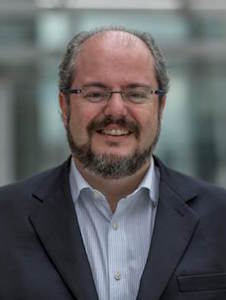
For most in-house counsel, career mobility is a natural aspect of the professional journey. In fact, according to the 2015 ACC Global Census, more than half (64 percent) of in-house counsel say that they would leave their current company for a chance to advance their careers elsewhere.
Newman Debs, general counsel of Unilever Latin America, is a notable exception to this statistic. Over the course of 24 years, Debs has played a pivotal role in advancing Unilever’s position as a household staple for big-name products like Axe body spray, Dove soap, and Lipton iced tea. Having this unique opportunity has given Debs a front-row seat to the advancing position of in-house counsel in Latin America — and more specifically in Brazil.

Newman Debs
“I believe the legal community in Brazil has changed dramatically in 25 years. Latin America as a whole is part of the so-called ‘emerging market.’ But our strength is grounded in our long cultural history, our legal presence, and our footprint in terms of production facilities,” he states.
Debs describes the rise of a new Brazil; where multinational corporations are flocking to the country for its economic potential and, as a result, in-house counsel are increasingly finding a seat at the executive table. To Debs, who began his career as one of only a handful of Brazilian in-house counsel, this is a welcome change.
“People are beginning to see Brazil as a center for creativity, adaptability, and innovation. And I think that has helped to shape the opinion of in-house counsel, who are now very valued by law firms and corporations,” he explains.
When describing his early life, Debs does not shy away from his affinity for the country that he calls home. During his childhood, he spent most afternoons reading with his mother, who was afraid of letting him play on the hectic streets of São Paulo.
“I’m thankful to her, because now I spend my most of my days reading,” Debs jokes.
As a teenager, his love for Brazil led him to aspire to become a diplomat — which would ultimately serve as a precursor to his interest in the legal profession. He enrolled in law school at the Universidade de São Paulo, thinking that a law degree would provide a necessary stepping-stone to a career in diplomacy. Halfway through his first year, however, Debs realized that he could use his legal education to represent Brazil in a different way.
“One day, I sat down and said: ‘You know what, the law is much more fun.’ I thought my career could be better served as a lawyer,” Debs reflects.
Upon graduation, Debs joined a medium-sized law firm in Brazil and began working in litigation. While the experience provided him with a unique international perspective, he began to crave a more collaborative environment. In 1993, Debs inquired about an open job as a legal assistant at Unilever. The decision would kick-start a two decade long tenure with the company — albeit with a couple of detours along the way.
“You will find that my career at Unilever is a little unconventional,” he explains.
After three years, Debs briefly left Unilever for his first in-house role at a telecom company. That’s when his former boss called — offering him a position as in-house counsel of Unilever Brazil. Ten days later, he was back at the company.
In 2009, the story repeated itself when Debs again left Unilever for an opportunity to work as vice president of PepsiCo Brazil. Three years later, he received a call from his former boss, offering him yet another position — this time as general counsel of Unilever Latin America. Debs jumped at the opportunity.
To provide some context, seven out of 10 households in the world carry Unilever products, which equates to nearly 2.5 billion people worldwide.
“I think it shows the value of maintaining connections. Having left and returned, I’ve been able to see Unilever’s growth as a company within the region. I think [Unilever] is in a very dynamic market. Consumer goods are never-ending. I have worked here for years and still have very different challenges and projects,” he says.
Throughout his career, Debs has witnessed Unilever create some of the biggest brand-name products in the world — 13 of which carry over one billion euros in annual sales. To provide some context, seven out of 10 households in the world carry Unilever products, which equates to nearly 2.5 billion people worldwide.
With over 400 brands in 190 countries, managing compliance efforts for Unilever is no small task. In Brazil alone, the company has 10 industrial complexes including over 15 plants, and more than 13,000 employees, making labor protocol increasingly top of mind. Debs maintains that regardless of size or scale, compliance can be achieved by instilling an ethical regulatory culture from the top down.
“Because we’re such a large organization, we cannot afford the luxury of assuming compliance. As a result, the top management of the company is highly committed to doing things ethically. I think it has been why we’ve been so successful in each one of our markets, and why ethics is such a major part of Unilever’s history,” he says.
To illustrate this point, Debs discusses Unilever’s “Sustainable Living Plan,” which reinforces the company’s commitment to hyper-local community growth — a mission that Debs is quite proud of. The plan has three primary goals: (1) helping more than a billion people take action to improve their health and well- being by 2020, (2) halving the environmental impact of Unilever products 2030, and (3) enhancing the livelihoods of millions of people by 2020.
These objectives are then deconstructed into smaller, regionally specific tasks. For example, Unilever plans to increase gender diversity in every stage of its business plan. By 2020, the company hopes to actively engage and empower more than five million women around the world. Debs asserts that initiatives like these are not only ethical, but they are good business.
"From Argentina to Mexico, I can see the positive impact of sustainability for both the industry and the community."
“We want our collaborators to be a sample of what society out there is like. Because we sell consumer products, we want everyone to connect with the products we’re selling. So it’s very important for us from a business perspective,” he says.
In Brazil, Debs notes a recent initiative by SunSilk — a Unilever hair product — to completely reinvent environmental sustainability initiatives in the country. In 2015, the company completely redesigned its plastic shampoo and conditioner bottles to substantially decrease the amount of plastic required for production. These new designs have reduced the amount of plastic in Latin America by 2,300 tons and have taken 300 trucks off of the road per year, reducing costs as well as the company’s environmental impact.
By integrating overarching goals with localized initiatives, the Sustainable Living Plan will directly impact global, regional, and local communities. To Debs, using the legal function to provide a positive impact in Latin America, while simultaneously working to advance the company’s corporate mission, is what he likes most about his job.
“From Argentina to Mexico, I can see the positive impact of sustainability for both the industry and the community. I was born here in Brazil and have lived in São Paulo for my whole life, so I am very proud of the work that we’re doing,” Debs says.
In recognition of his unwavering commitment to the community that fostered his own success, Debs received the General Counsel of the Year Award during the seventh annual Latin American Counsel Awards in Rio de Janeiro in March 2017. To Debs, the recognition represents a key step in the advancement of Latin America as a contributor under the Unilever umbrella.
“It was an honor for me to be recognized with this award. It’s the first time that a general counsel from Unilever Latin America received such an honor. I was amazed by the external impact. People from around the world have reached out via LinkedIn, wanting to benchmark their legal operations with ours, which is fantastic,” he says.
When asked about the in-house community in Brazil, Debs proudly shares that he is no longer one of a handful. From beginnings as a legal assistant to overseeing the objectives of an entire legal department, Debs has helped lay the foundation for a future of in-house prosperity in a new Brazil — one rich in creativity, adaptability, and innovation.
“When you work to build better bridges between the company and the community, the results are better for everybody,” he says. “I’m excited to see what the future holds.”
Getting to know... Newman Debs
What book are you currently reading and why?
I read three or four books at the same time because I get bored with one and have to move to another. Sometimes I worry that I might confuse the storylines, but I think the brain is fantastic in treating each book as a separate entity so I can digest everything together.
Where are you going on your next vacation?
I’m thinking Australia, because this is a lifetime dream. However, it’s very far away from here. That said, I think that it’s a paradise that many people dream of seeing.
If you could have dinner with anyone, living or dead, who would it be?
Probably my parents, as both of them have unfortunately passed. I would love to see them and discuss life once again.




